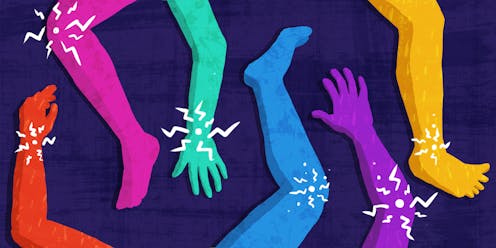Trust Me I'm An Expert: The science of pain - a podcast by The Conversation
from 2018-03-01T07:19:25

As many as one in five Australians suffer from chronic and recurring pain. But despite its prevalence, it’s not always easy to find the help you need to manage it.
“When I went through medical school, we had about one hour on acute pain. And the whole concept of chronic pain and how it’s so very different from acute pain was not something that was ever on our horizon,” pain expert Professor Fiona Blyth says in the latest episode of The Conversation podcast Trust Me, I’m An Expert.
On Trust Me, I’m An Expert, we ask researchers to take us behind the headlines and walk us through the research on issues making news.
Our latest episode takes a deep dive into the science of pain: what it is and what the evidence really says about how to manage it. Today, we’re talking about:
What exactly is pain?
Professor Lorimer Moseley explains to Deputy Health Editor Sasha Petrova what really happens in your body when you experience pain. Pain is meant to keep us safe, he says, but unfortunately your brain can play tricks on you, making you feel pain even when there’s no real need for it.
Bioplasticity – the body and brain’s ability to train and change itself – could hold the key, he says. Here’s a taste:
Professor Lorimer Moseley on bioplasticity.
After the codeine crackdown, what now?
We asked student Sabine Hamad, who has thus far managed her chronic and recurring pain with occasional codeine use, to join us in the studio with pain experts Professor Michael Nicholas and Professor Fiona Blyth, to talk about the recent ban on over the counter sales of codeine – and the alternatives.
Professor Michael Nicholas on making sense of someone’s pain.
Australia’s opioid issues
Ben Ansell spoke to Dr Suzanne Nielsen, a lead researcher from the National Drug and Alcohol Research Centre, about growing concern around opioid addiction in Australia.
Dr Suzanne Nielsen on addiction.
Talking about suicide and self-harm in schools can save lives
Our last story is about a different kind of pain. Education editor Sophie Heizer spoke to Dr Sarah Stanford, whose research focuses on self-harm in schools, churches, and other community settings. Dr Stanford said there are helpful – and harmful – ways for schools to talk about suicide:
Dr Sarah Stanford on suicide and self-harm prevention strategies.
For support, call Beyond Blue on 1300 22 4636, Lifeline on 13 11 14 or visit Headspace, which has information for schools, young people, and family and friends.
Trust Me, I’m An Expert is out at the start of every month. Find us and subscribe in Apple Podcasts, Pocket Casts or wherever you get your podcasts.
Additional audio
David Szesztay, Backward, Free Music Archive
Kindergarten, Unkle Ho, from Elefant Traks
Poddington Bear, Storm Passing from Free Music Archive
Poddington Bear, Paper Boat, from Free Music Archive
Poddington Bear, Waves, from Free Music Archive
Letmeknowyouanatole, Free Music Archive
Komiku, Resolution, Free Music Archive
Kosta T, Free Music Archive
Audiobinger, Stress, Free Music Archive.
Blue Dot Sessions, Paper Feather
A Life in Pictures by David Hilowitz
Further episodes of Trust Me, I'm An Expert
Further podcasts by The Conversation
Website of The Conversation